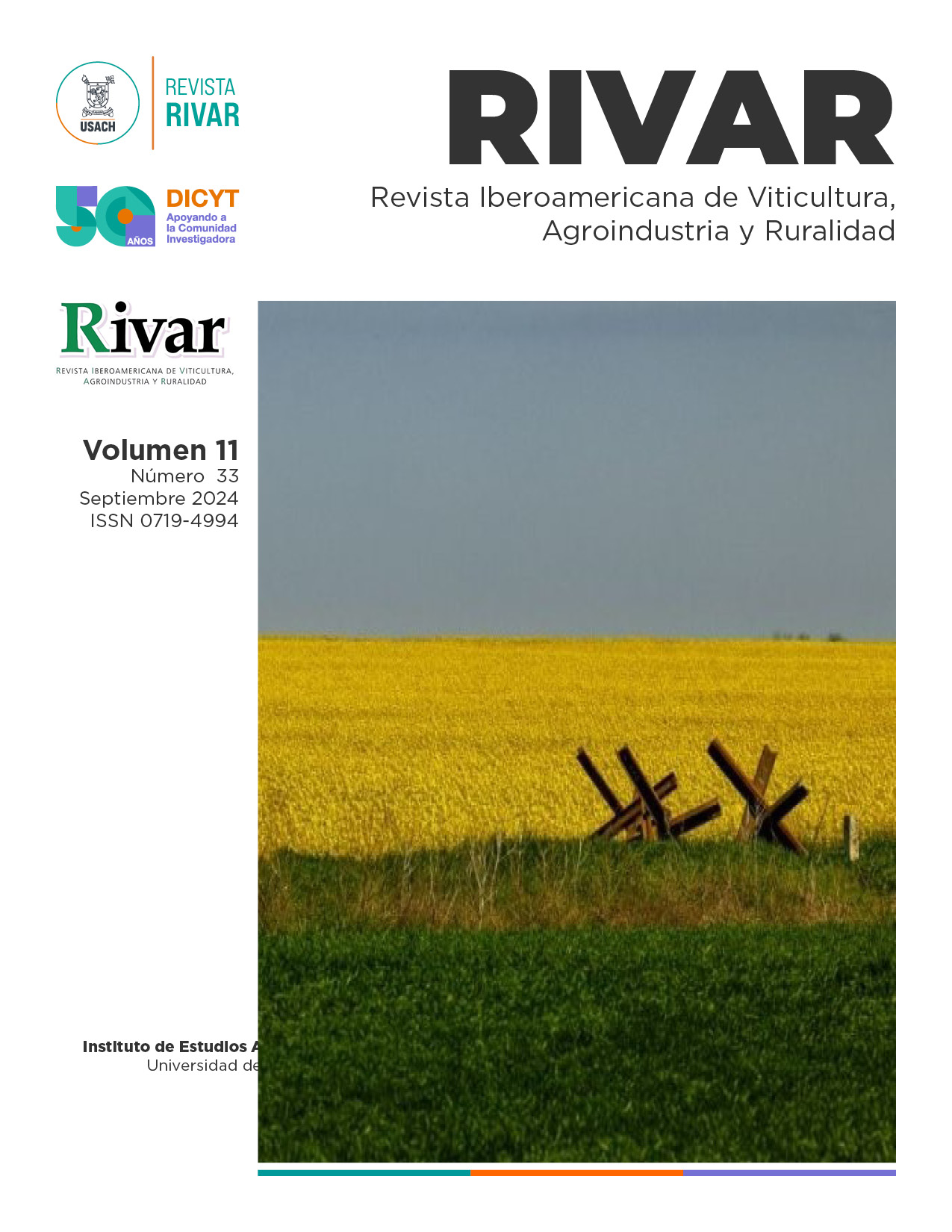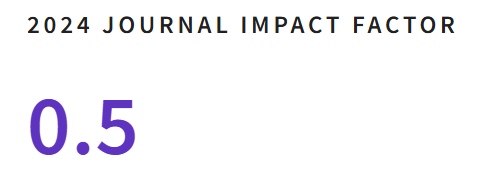Modelo quadrático para avaliar o impacto da Covid-19 nas habilidades sociais de recursos humanos
DOI:
https://doi.org/10.35588/rivar.v11i33.6221Palavras-chave:
modelo quadr´atico, Covid-19, recursos humanos, habilidades sociaisResumo
Apresentamos um modelo quádrico como mecanismo para avaliar as consequências do impacto do Covid-19 nas habilidades sociais do potencial de recursos humanos em Ucrânia. O modelo calcula os resultados e destaca a importância de dedicar recursos à atualização de habilidades sociais ou soft skills, considerando o trabalho a distância, o processo de transformação digital atual e os câmbios nos requisitos laborais que surgiram durante a pandemia Covid-19. Para isso, foram determinados indicadores específicos, relacionados com a influência das habilidades sociais de pessoas que trabalharam durante a pandemia Covid-19, e formaram-se 24 indicadores numéricos relacionados às habilidades sociais dos empregados. O cálculo do indicador integral basa-se numa enquete realizada a cem empleados de de diez empresas. Foram utilizados procedimientos analíticos con medios técnicos de informação com soporte de Microsof Excel, mediante correlação quadrática e análise de regresão, seguidos da formação de uma linha de tendência polinômica de quarto grau. Os resultados do análise confirmam o surgimento dos cenários potenciais que tem se tornado factíveis em meio da pandemia. Por diversas limitações, os empregados tem se visto na obrigação de adaptar e melhorar suas competências e outras habilidades em comunicação remota, para poder tomar decisões informadas en torno à gestão empresarial e actividades econômicas.
Downloads
Referências
Agrawal, S., De Smet, A., Poplawski, P. and Reich, A. (February 12, 2020). Beyond Hiring: How Companies are Reskilling to Address Talent Gaps. McKinsey and Company. https://www.mckinsey.com/business-functions/organization/our-insights/beyond-hiring-how-companies-are-reskilling-to-address-talent-gaps.
Bataklar, S. and Toy, Z. (2023). Soft Skills Acquisition for Engineering Undergraduates in Turkey: A Soft Skills Course Design. International Journal of Social Sciences and Education Research, 9, 115-125. https://doi.org/10.24289/ijsser.1260896
Chen, T. (2023). A Comparison of Economic Impact in US: Covid-19 and Ukraine Conflict. BCP Business & Management, 40, 292-299. https://doi.org/10.54691/bcpbm.v40i.4393
Chumachenko, D., Pyrohov, P., Meniailov, I. and Chumachenko, T. (2022). Impact of War on Covid-19 Pandemic in Ukraine: The Simulation Study. Radioelectronic and Computer Systems, 2, 6-23. https://doi.org/10.32620/reks.2022.2.01
Gnecco, G., Landi, S. and Riccaboni, M. (2023). The Emergence of Social Soft Skill Needs in the Post Covid-19 Era. Quality & Quantity, 58, 647-680. https://doi.org/10.1007/s11135-023-01659-y
Gopika, J. and Rekha, R. (2023). Awareness and Use of Digital Learning Before and During Covid-19. International Journal of Educational Reform https://doi.org/10.1177/10567879231173389
International Labour Organization (December 17, 2020). Overcoming the Soft Skills Gap and Covid-19 Challenges for Women Factory and Office Workers. International Labour Organization. https://www.ilo.org/manila/public/pr/WCMS_764520/lang--en/index.htm
Juhász, T., Horvath-Csikos, G. and Gáspár, T. (2023). Gap Analysis of Future Employee and Employer on Soft Skills. Human Systems Management, 42(5), 527-542. https://doi.org/10.3233/HSM-220161
Manyika, J., Lund, S., Chui, M., Bughin, J., Woetzel, J., Batra, P., Ko, R. and Sanghvi, S. (2017). Jobs Lost, Jobs Gained: What the Future of Work Will Mean for Jobs, Skills, and Wages. McKinsey and Company. https://www.mckinsey.com/featured-insights/future-of-work/jobs-lost-jobs-gained-what-the-future-of-work-will-mean-for-jobs-skills-and-wages
Martyniuk, V., Sokil, O., Lančarič, D. and Tsygylyk, N. (October 21 and 22, 2021). Corporate Social Responsibility’s Impact on the Development of Small and Medium-Sized Businesses in the Region: The Study of the Food Sector of the Lviv Region in Ukraine. In Proceedings of the VIII International Scientific Conference Determinants of Regional Development, 2 (pp. 221-233). Piła, Poland.
Martyniuk, V., Tsygylyk, N. and Skowron, S. (2021). The Impact of The COVID-19 Pandemic on Key Indicators of Personnel Security: A Study With Neural Network Technologies. European Research Studies Journal, 24(2): 141-151.
Mona, N. and Kawilarang, J. (2022). Digital Media Literacy During Covid-19 Pandemic Era among Millenials. Proceedings Of International Conference On Communication Science, 2(1), 115-124. https://doi.org/10.29303/iccsproceeding.v2i1.74
Musnandar, A. (2021). Soft Skills from Islamic Perspective for Maximal Students’ Learning Achievement. At-Turats, 14(2), 176-187. https://doi.org/10.24260/at-turats.v14i2.1856
Podavale, A., Malysh, N., Kuzmenko, O., Zadorozhna, V., Kolomiets, S. and Chemych, O. (2023). Influence of Meteorological Factors on Covid-19 Incidence in the Conditions of Ukraine. Bangladesh Journal of Medical Science, 22(2), 385-391. https://doi.org/10.3329/bjms.v22i2.65000
Podolchak, N., Martyniuk, V., Tsygylyk, N., Skowron, S. and Wołowiec, T. (2022). Mitigating Risks for Effective Personnel Management in the Organization of the Energy Sector due to the COVID-19 Pandemic. Sustainability, 14(16), 10055. http://dx.doi.org/10.3390/su141610055
Podolchak, N., Tsygylyk, N., Martyniuk, V. and Sokil, O. (September 5 to 17, 2021). Predicting Human Resource Losses due to the COVID-19 Pandemic in the Context of Personnel Security of Organizations. In 11th International Conference on Advanced Computer Information Technologies (ACIT) (pp. 333-336). Deggendorf, Germany. http://dx.doi.org/10.1109/ACIT52158.2021.9548361
Ryleeva, A., Khomutnikova, E. and Emanova, S. (2022). Developing Soft Skills in High School Students Using Digital Tools. Science for Education Today, 12(1), 77-98. https://doi.org/10.15293/2658-6762.2201.04
Sokil, O., Podolchak, N., Kniaz, S., Sokil, Y. and Kucher, L. (2022). Sustainable Development Prediction of Start-ups in Ukraine. Journal of Environmental Management and Tourism, 7(63), 1902-1911. https://doi.org/10.14505/jemt.v13.7(63).10
Strang, K.D. (2022). How Effective is Business Education in the Workplace: Structural Equation Model of Soft and Hard Skill Competencies. SN Business & Economics, 3(28). https://doi.org/10.1007/s43546-022-00404-1
Taula'bi, N., Sudarsi, E. and Girik Allo, M. (2023). The Strategy Used by the English Study Program MBKM Team to Improve the Soft Skills of Students Participating in the MBKM Program. Jurnal Onoma: Pendidikan, Bahasa, Dan Sastra, 9(1), 645-652. https://doi.org/10.30605/onoma.v9i1.2465
Tilman, J. (2021). Analysis Community Competence Development in Improving Live through Small and Medium Enterprise Investment in the Pandemic Era in East Timor. Journal of Social Entrepreneurship Theory and Practice, 1(2), 14-29. https://doi.org/10.31098/jsetp.v1i2.721
Vasiliou, V., Issari, P., Drosatou, C., Mitsi, E. and Tsakonas, I. (2023). LeadinCare: A Qualitative Informed Digital Training Platform Development to Increase Physicians’ Soft Communication Skills After Covid-19. Psychology, Health & Medicine, 29(1), 39-54. https://doi.org/1-16.10.1080/13548506.2023.2206144
Vovk, M., Kindrat, O. and Hrymak, O. (2022). Management of Economic Competition in the Context of Covid-19: European initiatives and lessons for Ukraine. Scientific Messenger of LNU of Veterinary Medicine and Biotechnologies, 24(99), 15-19. https://doi.org/10.32718/nvlvet-e9903
Wiryasti, C.H., Gunawan, J. and Muhamad, T. (2020). Rapid Assesment of Information and Communication Technology Skills Demand in Indonesia. International Labour Organization. https://www.ilo.org/wcmsp5/groups/public/---asia/---ro-bangkok/---ilo-jakarta/documents/publication/wcms_766461.pdf.
World Health Organization (2020). Physical and Mental Health Key to Resilience During COVID-19 Pandemic. http://www.euro.who.int/en/healthtopics/health-emergencies/coronaviruscovid-19/statements/statement-physicaland-mental-health-keyto-resilience-during-covid-19-pandemic
Yanto, H., Kiswanto, K., Baroroh, N., Hajawiyah, A. and Mat Rahim, N. (2022). The Roles of Entrepreneurial Skills, Financial Literacy, and Digital Literacy in Maintaining MSMEs during the Covid-19 Pandemic. Asian Economic and Financial Review, 12, 504-517. https://doi.org/10.55493/5002.v12i7.4535
Zuma, S. (2023). Exploring the Role of Soft Skills in Advancing the Employability of Business Graduates in Bangladesh. Journal of International Business and Management 4(1), 1-18. https://doi.org/10.37227/JIBM-2021-01-122









